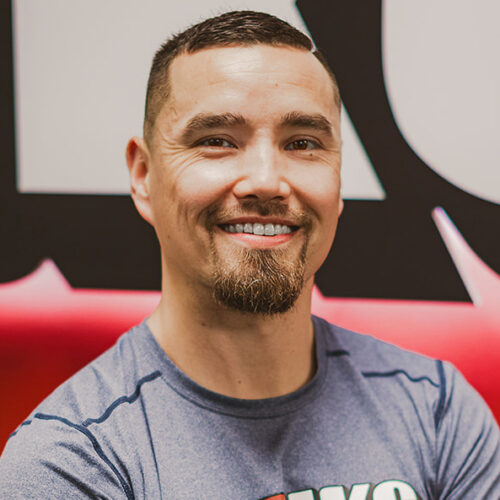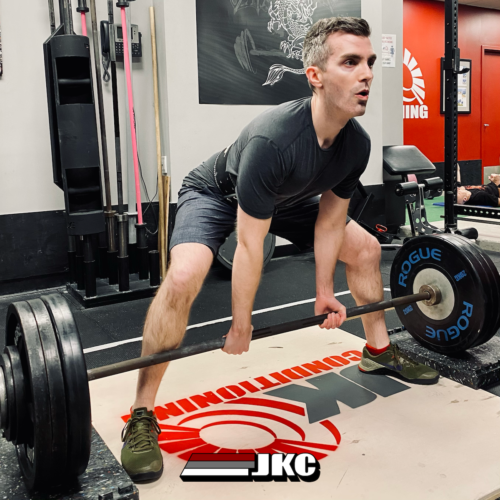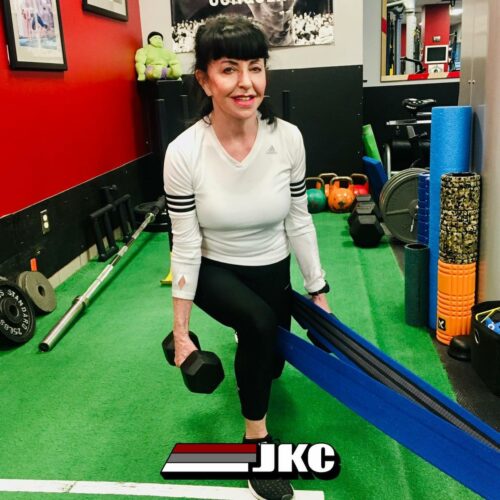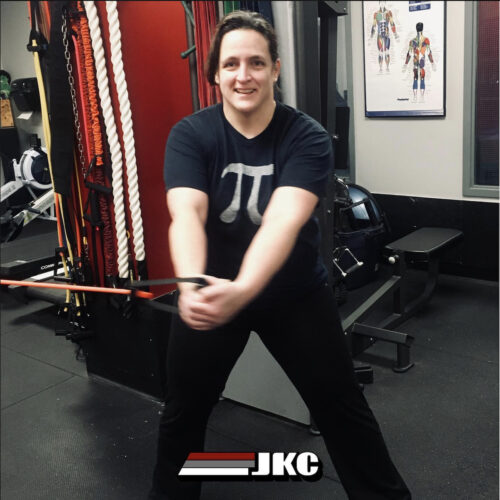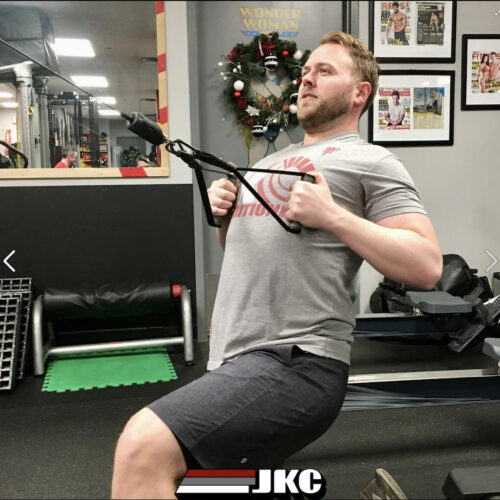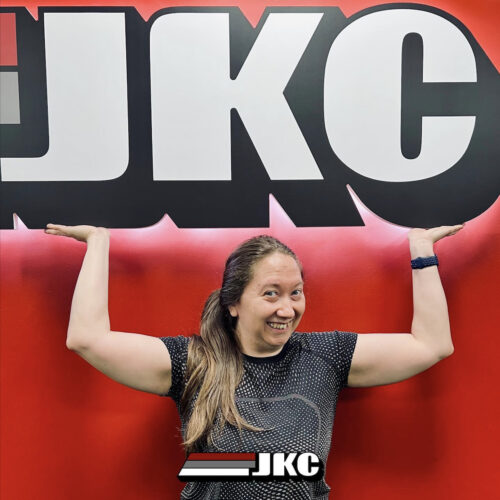 I’m pretty pumped to share an interview I did with S and C Coach to the St. John’s IceCaps, Justin Murphy. Justin also has an Athletic Therapy degree from York University, his Certified Exercise Physiologist certification from CSEP and is also a Registered Kinesiologist with the NLKA.
I’m pretty pumped to share an interview I did with S and C Coach to the St. John’s IceCaps, Justin Murphy. Justin also has an Athletic Therapy degree from York University, his Certified Exercise Physiologist certification from CSEP and is also a Registered Kinesiologist with the NLKA.
Justin was kind enough to chat with me about his inclusion of some Crossfit (CF) principles into his training. Justin is very athletic and has been incorporating some CF ideas for over 2 years into his workouts. I was curious about his opinions on CF based on his previous Athletic Therapy education and with the fact that people all over complain about high injury rates associated with CF.
Let’s get started:
JK: What benefits have you seen from incorporating CF-like principles into your training?
JM: There are a lot of benefits with CF. I myself have improved in many areas including strength, endurance, flexibility and body composition. I have even seen an increase in my explosive power. I would, however, argue that one of the most important benefits I’ve seen with CF is what I have learned relating to the variety of training. CF has allowed me to become very open minded when it comes to training and I have adopted a different approach to the way I do things. To be honest, the concept of “constantly varied” is what I enjoy most, and I like the idea of always being challenged.
JK: That’s awesome. I know a ton of people that become bored very fast in the gym. I like variety too, but like to keep consistent with the basic exercises week in and week out but like to challenge myself to using heavier weight, shorter rest periods or creating supersets that I haven’t done before. With your education and experience including CF-type ideas into your training, do you see any risks with CF?
JM: Like any other sport or activity, there’s always a risk for injury. With respect to CF, there is definitely a chance for injury when performing a complex movement while exhausted, but I think that’s where you need to use your own judgment. Many of the workouts are structured under a timed setting, but you don’t have to rush through a workout with sloppy form just because you are trying to hit a PR.
So why do people do it? I think there are a couple factors involved; both the individuals themselves and their trainers. Firstly, individuals must recognize when it is appropriate to push their limits. It’s also important that an individual know and understand the risk factors before starting, and if they are willing to accept them, then so be it. This of course shouldn’t excuse the second factor though. I also think that it’s important for CF trainers to recognize and prevent improper technique, and really understand what an individual is capable of before getting them to do a difficult movement under pressure (fatigue and time).
Do I think that CF trainers set individuals up for injuries? Of course not. That’s definitely not the intention. I do think that there may be an increased risk of injury with an inexperienced trainer, just like I wouldn’t rock climbing with an inexperienced instructor. I will not deny the fact that there are probably a lot of bad trainers, but as with any other profession, I do not think that the few bad professionals represent the whole profession or organization.
JK: I totally agree. People must use their common sense in the gym and should know what their limits are and when not to cross them. As Dan John says, first rule in the gym is to do no harm. The gym is a place where we make our selves better, whether for life or sport. S and C coaches are no different from CF coaches who are no different from personal trainers or Kinesiologists. All should be educated enough to recognize and teach/coach proper technique and should also know contraindicated bodies. By that, I mean, not all bodies are made the same (due to different life experiences, postural habits, previous injuries etc); therefore, not all exercises are fit for everyone. Have you ever been injured implementing CF-principles into your workouts?
JM: Other than a few torn calluses, I have yet to sustain any major injuries while doing CF style workouts. I have also spoken with a few health care practitioners affiliated with CF gyms, just out of curiosity, to find out what kind of injuries they deal with on a day to day basis. They do see a lot of upper body injuries, but (and this is a big ‘but’) nothing more than what they see from individuals playing competitive or recreational sports.
JK: That’s good and true, as with any other professional or recreational sports, injuries are bound to happen and part of the game. Lastly, tell my readers what you’re training goals are and your finals thoughts on CF.
JM: I myself don’t really have any specific training goals, but I do wish to be well rounded in all aspects of fitness. I fully understand that I can’t be the best at everything, but that fits well with me because I enjoy the variety. This is not to say that CF wouldn’t help me if I wished to get better in a particular area. I think the problem for a lot of individuals wanting to utilize CF for training purposes is that they are afraid about the lack of periodization. The beauty about CF, however, is that it’s not a one way fits all style of training. You can incorporate various training methods into your workouts and have a bias towards any area of weakness. I have seen a lot of individuals benefit from this type of training, and also know of professional athletes who’ve started to incorporate CF style workouts into their own training programs. Whether or not CF is the best way to train is certainly a question for debate. However, I would highly suggest any naysayers to give it a try, keep an open mind, have fun, and see where it takes you.
JK: Great advice Justin. I find people too critical these days. I have learned over the years that people are going to have their opinions, good or bad, on everything. If CF works for you, awesome, if not, find something else. As I have said before, I like aspects of CF but don’t agree with all of it, but that’s my opinion. Does that make me a bad person? Absolutely not. I was Tweeting back and forth with Sean Hyson, the Fitness Editor of Men’s Fitness and he agrees with me that AMRAP (As Many Reps As Possible) is not a great idea when applied to O-lifts and jumps.
I also like incorporating CF-principles into my workouts, but these principles have been around long before CF. Such aspects include supersets and timed-sets. Does it mean I do CF? No. I like high intense workouts as much as the next guy, but wouldn’t risk injuring myself just to get a certain number of reps or to pull a certain weight. As I do with my clients, I try to draw the line between success and failure. For example, here’s a clip of me pulling my 1RM deadlift (so far); nothing amazing but I’m proud of it as it’s closer to my 4 plate/side goal. I wouldn’t try to pull 405 based on my form at 395; it’s just not worth it to me.
Thanks for reading and I hope you found this as insightful as I did.
Am I saying you should or shouldn’t do CF? NO, just trying to open your eyes to opinions from experienced and educated people.
Thanks again Justin, I really appreciate it.
-JK
